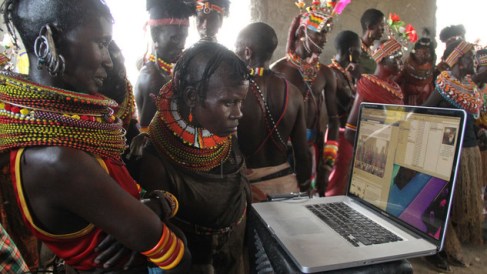By Sonny Aragba-Akpore
Even when it seems that Nigeria wobbles on the road to broadband penetration especially as its quest to meet its own 70% set target appears unrealistic going by the National Broadband Plan (2020-2025), the country is not alone.
RELATED: Review of Internet access, smartphone use, and related outcomes in Africa
The United Nations (UN) body on information and communications technology (ICT) the International Telecommunications Union (ITU) and United Nations Education, Scientific and Cultural Organization (UNESCO) are more worried.
The ITU in collaboration with UNESCO created Broadband Commission in July 2010, and it was specifically to ensure broadband connectivity as part of global Sustainable Development.
But when they met in Geneva, Switzerland on July 6,2025 to mark the 15th anniversary of the commission, and take stock of what has been achieved in broadband connectivity in 15 years, its verdict was not very comfortable.
“In this landmark year for the Broadband Commission, it is heartening that 95 per cent of humanity is within reach of broadband, however, the real challenge is ensuring that everyone can afford access, express themselves, and use information in a meaningful way,” according to Tawfik Jelassi, UNESCO Assistant Director-General.
Addressing the barriers to access
Speaking further, he said “UNESCO, together with its partners, is working to address the barriers – including those related to skills development and local language content – to ensure that the promise of connectivity for sustainable development becomes a reality for all.”
What this means is that though, broadband penetration is possible for 95% of global population, the twin problems of access and affordability remain hard nuts to crack.
Are ITU and UNESCO in a dilemma? The meeting last week in Geneva threw more light on this. “The Broadband Commission´s work over 15 years has helped change global connectivity and digital development,” said Carlos M. Jarque, representing Carlos Slim Helu, Co-Chair of the Commission.
“Since 2010, the number of Internet users has grown by the billions. To expand on this progress, we need to encourage forward-looking regulatory frameworks, strong investment, digital transformation in businesses and public institutions, and digital skills of the population.”
With 2.6 billion people around the world still offline, the Broadband Commission’s work serves as a policy and programmatic guide for national and international action in broadband development and for achieving universal connectivity.
“Fifteen years ago, we began with the simple conviction that broadband must reach everyone, everywhere, because it is an essential driver of sustainable development,” said President Kagame, Co-Chair of the Commission.
Broadband powers economies, expands access to knowledge
“Today, broadband powers economies, expands access to knowledge in rural as well as urban areas, and brings communities closer, across continents.”
The United Nations (UN)Broadband Commission for Sustainable Development met in Geneva, Switzerland, July 6,2025 to commemorate 15 years of advancing universal broadband access and digital inclusion.
The meeting took place as digital technology communities get set to join together for the World Summit on the Information Society (WSIS)+20 High-Level Event 2025 and the AI for Good Global Summit 2025, which also took place in Geneva last week.
Founded in 2010 by the International Telecommunication Union (ITU), the United Nations Educational, Scientific and Cultural Organization (UNESCO), co-Chaired by President Paul Kagame of Rwanda, and Carlos Slim Helú, a Mexican investor and philanthropist, the public-private collaboration has elevated universal broadband connectivity to the forefront of global policy discussions.
Commissioners, including global leaders, CEOs and heads of international organizations, have championed broadband as a cornerstone of economic growth and sustainable development.
Once seen as technical infrastructure, broadband is now central to national competitiveness and essential services that benefit economies, governments, and societies.
International policy agenda on expanding broadband access
“Since our first gathering in 2010, this Commission has put broadband at the front and centre of every global development conversation, and consistently championed connectivity by setting ambitious targets for access, use, affordability, skills and policy,” said ITU Secretary-General Doreen Bogdan-Martin, Co-Vice Chair of the Commission.
“This work has been transformative for expanding digital connectivity, and is a valuable precedent for future collaborative, multistakeholder work to connect the unconnected.”
During the meeting, the Broadband Commission reviewed the results of the Data Governance Toolkit: Navigating Data in the Digital Age. The toolkit provides practical guidance for policymakers reviewing data regulation, cross-border flows, and responsible data use in the era of AI and emerging technologies.
The Commission’s Working Group on Data Governance report was formally issued on Tuesday, July 8 at the World Summit on the Information Society (WSIS)+20 High-Level event 2025.
The Broadband Commission for Sustainable Development was established in 2010 by ITU and UNESCO with the aim of boosting the importance of broadband on the international policy agenda and expanding broadband access in every country as key to accelerating progress towards national and international development targets.
Led by President Paul Kagame of Rwanda and Carlos Slim Helù of Mexico, it is co-chaired by ITU’s Secretary-General Doreen Bogdan-Martin and UNESCO Director-General Audrey Azoulay. It comprises over 50 Commissioners who represent a cross-cutting group of top CEO and industry leaders, senior policymakers and government representatives, and experts from international agencies, academia and organizations concerned with development.
Digital divides persist
The ITU Facts and Figures released on November 27,2024 indicated that an estimated 5.5 billion people were online in 2024.This was an increase of 227 million individuals based on revised estimates for 2023, according to new figures from the ITU.
The estimates featured in ITU’s Facts and Figures 2024 show that connectivity continues to increase worldwide but reveal the complexities of reaching communities in low-income countries.
“While an estimated 68 per cent of the global population is now online and all indicators tracked in the report show improvement, stubborn digital divides persist and about one-third of the world’s people remain offline. Facts and Figures 2024 is a tale of two digital realities between high-income and low-income countries,” said ITU Secretary-General Bogdan-Martin.
““Stark gaps in critical connectivity indicators are cutting off the most vulnerable people from online access to information, education and employment opportunities. This report is a reminder that true progress in our interconnected world isn’t just about how fast we move forward, but about making sure everyone moves forward together.”
Internet use remains tightly linked to the level of development
Facts and Figures 2024 shows that Internet use remains tightly linked to the level of development. In high-income countries, 93 per cent of the population is estimated to be using the Internet in 2024. This contrasts with low-income countries where only 27 per cent of the population is estimated to be online.
Connectivity challenges also remain in the least developed countries (LDCs) where only 35 per cent of the population is estimated online and landlocked developing countries (LLDCs) with only 39 per cent online.
In total, an estimated 2.6 billion people were offline in 2024, accounting for 32 per cent of global population. This is down from the newly revised estimate of 2.8 billion for 2023, which represents 35 per cent of the population.
“The world is inching towards universal access at a time that it should be sprinting,” said Cosmas Luckyson Zavazava, Director of ITU’s Telecommunication Development Bureau.
“While we continue to make progress on connectivity, our advances mask significant gaps in the world’s most vulnerable communities, where digital exclusion makes life even more challenging. We must intensify our efforts to remove the barriers that keep people offline and close the usage gap, and renew our commitment to achieving universal and meaningful connectivity, so that everyone can access the Internet.”






























